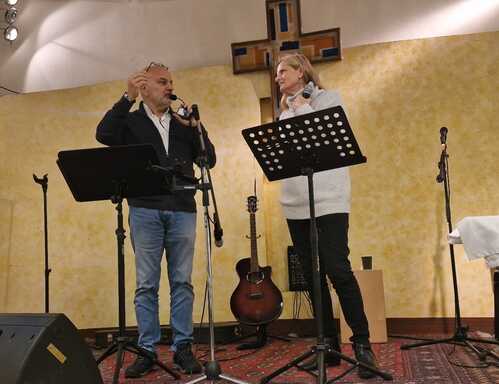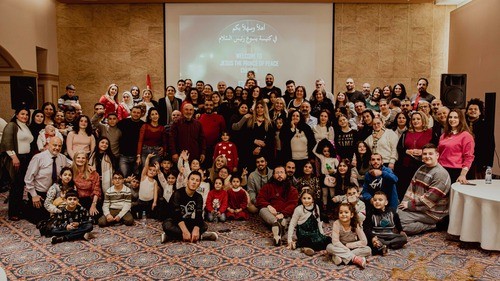March 17th, 2025
by Christen Forster
by Christen Forster
Jesus Prince of Peace Church - Lebanon
At our March prayer breakfast I, (Christen) introduced Fouad and Julie... a couple I have known since Judith and I did a marriage preparation course with them back in 1990. Some Kings Folks met them in in the summer of 2024 at the Revive and more of you will, I hope meet them at this summers camp!
Fouad and Julie have planted and lead the Jesus Prince of Peace Church in Beirut, Lebanon. You can read more about the church by clicking the link.
Fouad and Julie have planted and lead the Jesus Prince of Peace Church in Beirut, Lebanon. You can read more about the church by clicking the link.

They had sent through some up-to-date prayer request which we prayerd for, but I've included them below... so we can all be reminded to pray. for them. Pray also that they get an opportunity to join us at some point in the future.
Open up the sections below for information to pray into and to see how we prayed for Lebanon together last Sunday.
Open up the sections below for information to pray into and to see how we prayed for Lebanon together last Sunday.
A report on recent political and economic history in the region.
In the years following the civil war, Lebanon experienced periods of reconstruction and relative stability, but political corruption and mismanagement hindered sustainable development. The Syrian withdrawal in 2005 post-Hariri assassination brought a semblance of sovereignty, yet political paralysis persisted amid challenges related to governance and national unity.
The economic situation under the influence of the Assad Syrian regime, Hezbollah and the corrupt political system, has been a major concern, particularly since the onset of a severe financial crisis in 2019, which many have termed "the worst economic crisis in Lebanon's modern history." The Lebanese pound lost significant value, leading to skyrocketing inflation, widespread poverty, unemployment, and a collapse of essential services. The Lebanese banking system has been a central pillar of its economy but has faced a severe crisis since 2019. With rampant government mismanagement and a collapse in confidence, banks imposed informal capital controls, leading to the effective freezing of savings. This situation left many citizens unable to access their funds, devastating personal finances and triggering widespread public discontent. The COVID-19 pandemic exacerbated these issues, further straining an already fragile health care system and pushing millions into poverty.
In August 2020, the catastrophic explosion at the Beirut port, attributed to poorly stored ammonium nitrate (corruption), led to massive destruction, further undermining public trust in the government and resulting in protests calling for accountability and systemic reform. As Lebanon approaches the present day, the economic and political situation remains dire, with ongoing instability and a lack of clear political direction.
After more than two years of a presidential vacuum in Lebanon and a resigned government, last month President Joseph Aoun was elected, having served for eight years as Commander of the Lebanese Army, effectively the only functioning institution in the country. A new Prime Minister (Nawaf Salam), who was a judge in the International Criminal Court, was appointed, and a new government was formed, which gained the confidence of Parliament. There is an overwhelming sense of hope among the Lebanese people, something that has been missing for years.
This economic uncertainty and political instability have deterred foreign investors, crucial for economic growth and development. The financial crisis, coupled with inadequate governance, has led to a marked decline in foreign investments, exacerbating the economic situation and hampering recovery efforts.
The regime changes and conflict in neighboring Syria have had critical repercussions in Lebanon, a country deeply connected historically and socially to Syria. Lebanon has struggled to manage the influx of Syrian refugees, estimated at over a million, straining its already limited resources and infrastructure. The spillover effects of Syrian instability continue to challenge Lebanon's security and socioeconomic stability.
Certainly! Here’s an updated and more detailed section regarding the recent Hezbollah-Israeli tensions, particularly the conflict that reignited in October 2023, as well as its broader implications for Lebanon, followed by a revised set of prayer points.
In October 2023, renewed conflict erupted between Hezbollah and Israel, escalating the long-standing tensions between the two entities. The fighting ignited after a series of skirmishes along the Lebanon-Israel border, culminating in Hezbollah launching drone strikes and rockets into northern Israel. In response, the Israeli military conducted extensive airstrikes in southern Lebanon and targeted Hezbollah positions.
The impact of the war between Hezbollah militia and the Israeli army, had severe implications for the already suffering Lebanese people. As fighting escalated, civilian casualties and displacement sparked new humanitarian concerns. Increased military engagement risks drawing Lebanon further into regional conflicts and stirring sectarian tensions within its borders as various parties take sides with or against Hezbollah. The international community's response has also become increasingly complex, with geopolitical dynamics at play that could affect Lebanon's stability and sovereignty.
Amid these crises, the evangelical church in Lebanon remains a beacon of hope and support. The church is providing assistance to the displaced, offering spiritual counselling, and addressing the immediate physical and emotional needs of affected populations. It continues to play a significant role in fostering hope, resilience, and social support among communities. Churches are crucial in providing social services, spiritual guidance, and helping communities cope with the challenges of political and economic instability. As they engage in humanitarian efforts, support the marginalized
The economic situation under the influence of the Assad Syrian regime, Hezbollah and the corrupt political system, has been a major concern, particularly since the onset of a severe financial crisis in 2019, which many have termed "the worst economic crisis in Lebanon's modern history." The Lebanese pound lost significant value, leading to skyrocketing inflation, widespread poverty, unemployment, and a collapse of essential services. The Lebanese banking system has been a central pillar of its economy but has faced a severe crisis since 2019. With rampant government mismanagement and a collapse in confidence, banks imposed informal capital controls, leading to the effective freezing of savings. This situation left many citizens unable to access their funds, devastating personal finances and triggering widespread public discontent. The COVID-19 pandemic exacerbated these issues, further straining an already fragile health care system and pushing millions into poverty.
In August 2020, the catastrophic explosion at the Beirut port, attributed to poorly stored ammonium nitrate (corruption), led to massive destruction, further undermining public trust in the government and resulting in protests calling for accountability and systemic reform. As Lebanon approaches the present day, the economic and political situation remains dire, with ongoing instability and a lack of clear political direction.
After more than two years of a presidential vacuum in Lebanon and a resigned government, last month President Joseph Aoun was elected, having served for eight years as Commander of the Lebanese Army, effectively the only functioning institution in the country. A new Prime Minister (Nawaf Salam), who was a judge in the International Criminal Court, was appointed, and a new government was formed, which gained the confidence of Parliament. There is an overwhelming sense of hope among the Lebanese people, something that has been missing for years.
This economic uncertainty and political instability have deterred foreign investors, crucial for economic growth and development. The financial crisis, coupled with inadequate governance, has led to a marked decline in foreign investments, exacerbating the economic situation and hampering recovery efforts.
The regime changes and conflict in neighboring Syria have had critical repercussions in Lebanon, a country deeply connected historically and socially to Syria. Lebanon has struggled to manage the influx of Syrian refugees, estimated at over a million, straining its already limited resources and infrastructure. The spillover effects of Syrian instability continue to challenge Lebanon's security and socioeconomic stability.
Certainly! Here’s an updated and more detailed section regarding the recent Hezbollah-Israeli tensions, particularly the conflict that reignited in October 2023, as well as its broader implications for Lebanon, followed by a revised set of prayer points.
In October 2023, renewed conflict erupted between Hezbollah and Israel, escalating the long-standing tensions between the two entities. The fighting ignited after a series of skirmishes along the Lebanon-Israel border, culminating in Hezbollah launching drone strikes and rockets into northern Israel. In response, the Israeli military conducted extensive airstrikes in southern Lebanon and targeted Hezbollah positions.
The impact of the war between Hezbollah militia and the Israeli army, had severe implications for the already suffering Lebanese people. As fighting escalated, civilian casualties and displacement sparked new humanitarian concerns. Increased military engagement risks drawing Lebanon further into regional conflicts and stirring sectarian tensions within its borders as various parties take sides with or against Hezbollah. The international community's response has also become increasingly complex, with geopolitical dynamics at play that could affect Lebanon's stability and sovereignty.
Amid these crises, the evangelical church in Lebanon remains a beacon of hope and support. The church is providing assistance to the displaced, offering spiritual counselling, and addressing the immediate physical and emotional needs of affected populations. It continues to play a significant role in fostering hope, resilience, and social support among communities. Churches are crucial in providing social services, spiritual guidance, and helping communities cope with the challenges of political and economic instability. As they engage in humanitarian efforts, support the marginalized
A more personal prayer request...
We have been in Lebanon since 1994, have planted 2 congregation that are part of the Ichthus Christian Fellowship. We have been involved with all sorts of crises, started helping displaced people in 1995 war, 2006 war, Iraqi refugees and Syrian refugees, we have helped fixing homes and replacing appliances after the 2020 explosion as well as working recently with displaced people from the south and Baalbek area.
We are thankful for all that the Lord has given us, people, relationships that we couldn’t have met under normal circumstances, we give thanks for the financial provision that he gave us to be able to carry on distributing food portions, Blankets, heaters and medical assistance to the displaced and those who are less fortunate.
Please pray for growth, for our youth groups and for 2 new areas that we are attempting to plant new churches.
from Fouad, Julie and Family.
We are thankful for all that the Lord has given us, people, relationships that we couldn’t have met under normal circumstances, we give thanks for the financial provision that he gave us to be able to carry on distributing food portions, Blankets, heaters and medical assistance to the displaced and those who are less fortunate.
Please pray for growth, for our youth groups and for 2 new areas that we are attempting to plant new churches.
from Fouad, Julie and Family.
A summary of how we prayed
There where a number of Biblical observations made as we prayed for the work in Beirut and among the constant influxes of refugees that Lebanon see, caught between the tensions between Syria and Israel.
Nigel pointed out that when he met Fouad and Julie it was at at Ashburnham which has several Cedars that where planted from seeds actually taken from Lebanon. We noted that it was these famous trees from the region that Solomon probably imported the wood beems of the first temple and we prayed for those believers currently overcoming problems in Lebanon as pillars in God's new temple (Revelation 3:12).
We prayed for a "lush forest" of these overcoming believers. for resources, peole and wisdom to minister to the new waves of refugees and for the other churches in relationship with Jesus, Prince of Peace Church.
We also noted that the Syro-Phoenician lady, who challenged Jesus that she should receives crumbs from his table (Matthew 15:21–28, Mark 7:24–30), was from what is now Lebanon.Following this encounter Jesus fed 4000 Gentiles... it was as if Lebanon had played a transitioning role in te Gospel going to the nations.
So we prayed for the blessing as the Gospel comes again to the regions it first went out from!
Nigel pointed out that when he met Fouad and Julie it was at at Ashburnham which has several Cedars that where planted from seeds actually taken from Lebanon. We noted that it was these famous trees from the region that Solomon probably imported the wood beems of the first temple and we prayed for those believers currently overcoming problems in Lebanon as pillars in God's new temple (Revelation 3:12).
We prayed for a "lush forest" of these overcoming believers. for resources, peole and wisdom to minister to the new waves of refugees and for the other churches in relationship with Jesus, Prince of Peace Church.
We also noted that the Syro-Phoenician lady, who challenged Jesus that she should receives crumbs from his table (Matthew 15:21–28, Mark 7:24–30), was from what is now Lebanon.Following this encounter Jesus fed 4000 Gentiles... it was as if Lebanon had played a transitioning role in te Gospel going to the nations.
So we prayed for the blessing as the Gospel comes again to the regions it first went out from!
The Barnabas Trust report on Christianity in Lebanon
Lebanon used to be a Christian majority country ...
https://www.barnabasaid.org/gb/countries/Lebanon/
https://www.barnabasaid.org/gb/countries/Lebanon/

Recent
Archive
2026
February
March
2025
January
February
March
April
May
June
July
August
October
November
2024
September
October
November
Categories
Tags
1 Kings 11
1 Timothy 3:
2025
Advent
Alphabet
Amy Grant
Ancient Hebrew
Anointing
Baptism
Barbara Todd
Bathsheba
Ben Trigg
Births
Camp
Capernaum
Caroline D
Carol
Carpenter
Chris Eaton
Christmas
Creation
Dedication
Divorce
Elizabeth
Exodus 20
Family Worship
Fayre
Gabriel
Galatians 3:28
Galatians
Galilee
Genesis 1:27
Genesis 29
Genesis
God with us
Good News
Gospel
Graham Kendrick
Holiday
Hong Kongers
Ichthus
JesusCentred
John 11:32-38
John 11:41-44:4
John 12:12-19
Joseph
Journey
Kenya
Lars
Lazarus
Lebanon
Lent 2026
Luke 1-2
Luke 1:19
Lunar New Year
Magi
Manna
Marriage
Mary and Joseph
Mary
Matthew 19:4
Matthew 1:18-25
Matthew 27:45-46
Matthew 28 1:7
Matthew 28:1-7
Matthew 2:
Matthew 5
Matthew
Mike Burn
Missiom
Mission
Nativity
Nepal
Open Air
Outreach
Poem
Prayer
Promises
Prophecy
Revelation
Revive
Rib
Rising Generation Music
Ruth
Sandra
Shan
Shepherds
Song
Sunday Highlight
Testmony
The Call of Christ
The Coming
Vietnam
Wokingham May Fayre
Word of God
adv
incarnation
kimg
mystery
three kings

No Comments